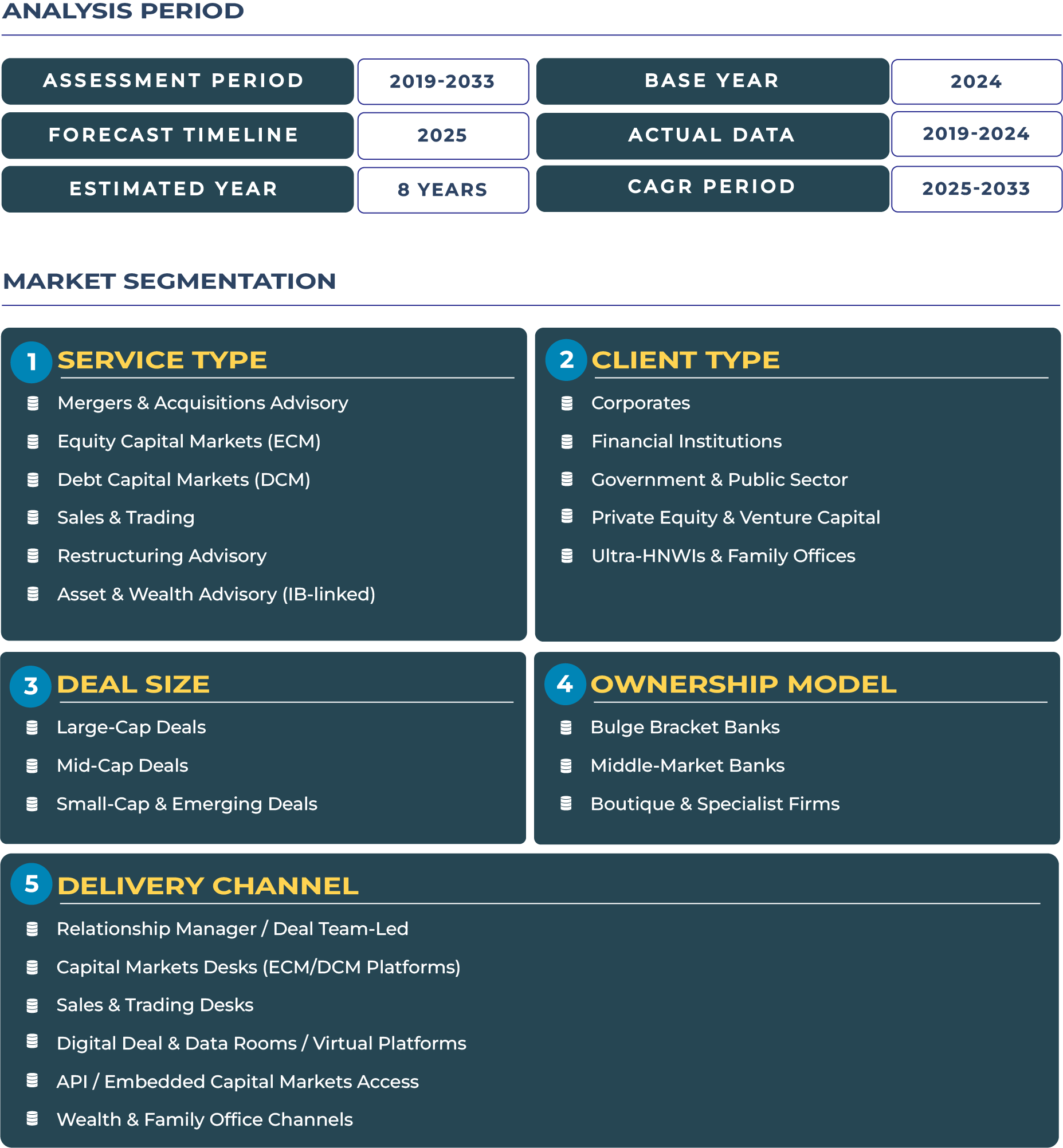Benelux Investment Banking Market Outlook: ESG-Driven Cross-Border Finance Shaping the Region’s Future
The Benelux region, comprising Belgium, the Netherlands, and Luxembourg, has emerged as a prominent hub in the investment banking market, driven by its strong cross-border finance ecosystem, proximity to EU decision-making, and leadership in sustainable finance. Investment banks in the region are increasingly leveraging ESG-compliant advisory services, privatization-linked deals, and capital markets expertise to capture demand from corporates and investors seeking both resilience and growth. In 2025, the Benelux investment banking industry is valued at USD 5.7 billion and is projected to reach USD 7.6 billion by 2033, growing at a CAGR of 3.5% from 2025–2033, according to DataCube Research. This performance reflects the region’s positioning as a gateway for cross-border merger and acquisition, ECM, and DCM transactions across Europe, particularly in sustainability-driven sectors.
Note:* The market size refers to the total revenue generated by banks through interest income, non-interest income, and other ancillary sources.
The market outlook is reinforced by the European Commission’s emphasis on green investments and by the EU Finance and Capital Markets Union, which creates a favorable policy environment for cross-border capital flow. This trend has particularly strengthened Benelux’s positioning as a regional hub for ESG-linked advisory, privatization financing, and equity capital raising. Despite global geopolitical and economic uncertainties, Benelux’s stability, coupled with digital banking advances, provides confidence for sustained growth in the sector.
Drivers & Restraints: Strategic Forces Shaping Benelux Investment Banking
Key Growth Drivers: Cross-Border Finance and ESG Mandates
One of the primary growth drivers of the Benelux investment banking ecosystem is its role as a centralized hub for cross-border financial services. With Luxembourg housing over USD 5 trillion in assets under management and Amsterdam’s growth as a post-Brexit financial center, demand for investment banking services in merger and acquisition, ECM, and structured finance continues to expand. Additionally, ESG mandates by EU regulators have pushed corporates to raise capital via green bonds, ESG-driven IPOs, and sustainable project finance. The Benelux banks are also capitalizing on the digitalization of investment workflows, creating opportunities to streamline operations and capture new mid-market corporate clients.
Restraining Factors: Competitive Pressures and Regulatory Complexities
Despite strong fundamentals, the Benelux investment banking sector faces challenges that temper its growth potential. Competition from neighboring hubs like Frankfurt, Paris, and London remains strong, especially in attracting global IPOs and mega merger and acquisition deals. Regulatory complexity across multiple jurisdictions within the EU also increases transaction friction and compliance costs for banks operating in the Benelux region. Furthermore, geopolitical uncertainties, including EU–US trade disputes and the effects of war-like situations on capital flows, could create volatility in debt capital markets and restructuring advisory services.
Trends & Opportunities: Digitalization and ESG Finance Accelerating Market Potential
Emerging Trends: ESG-Linked Funding and Green Capital Markets
A defining trend in the Benelux investment banking landscape is the rise of ESG-linked financing. Luxembourg’s role as the leading issuer of green bonds in the EU and the Netherlands’ adoption of digital-first investment products highlight the region’s positioning. Corporate clients increasingly demand advisory services to meet sustainability disclosures, boosting opportunities in asset & wealth advisory (IB-linked) as well as DCM advisory for green bonds. The integration of digital platforms further enhances transparency and efficiency across transactions, enabling firms to serve both large corporates and SMEs with scalable solutions.
Future Opportunities: Digital Advisory and Regional Integration
Looking ahead, the most significant opportunities lie in digital advisory services and regional integration. Investment banks in the Benelux can scale by advising on digital IPOs, fintech partnerships, and AI-powered portfolio management. With the EU’s emphasis on cross-border collaboration, Benelux firms are also positioned to expand into advisory for pan-European infrastructure investments and mid-market cross-border merger and acquisition. These opportunities highlight the region’s ability to balance its traditional financial hub status with new innovation-driven growth areas.
Competitive Landscape: ESG Advisory and Strategic Collaborations Defining Market Moves
The competitive landscape of the Benelux investment banking sector features a blend of international players and regional banks positioning themselves as ESG advisory leaders. Global institutions such as Deutsche Bank and regional banks are increasingly embedding sustainability-focused products and cross-border financing expertise. A notable example is the 2025 partnership between Deutsche Bank and Mastercard to power open banking payments for merchants in the Benelux, reflecting the strategic alignment of digitalization with traditional investment banking services.
Local banks continue to leverage ESG integration, capital market innovations, and mid-market merger and acquisition advisory to strengthen competitiveness. Strategies like focusing on cross-border ESG advisory services, scaling digital corporate finance, and expanding restructuring capabilities ensure that the Benelux region maintains its leadership in Europe investment banking ecosystem. The adaptability of players in balancing global capital market volatility with regional opportunities underscores the resilience of this market.








